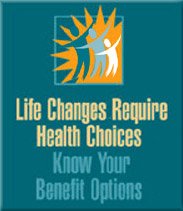Life Changes Require Health Choices... Know Your Benefit OptionsOctober 2010 Printer Friendly Version • En Español
If your spouse has health coverage available, compare the health benefits, cost, and options under both plans, then decide which one works best for you. Pregnancy, Childbirth, and AdoptionWhat You Need to Know: HIPAA places limits on the amount of time a preexisting condition exclusion period may apply. In addition, health care plans cannot consider pregnancy a preexisting condition, even if the woman did not have previous coverage. Birth and adoption (including placement for adoption) may trigger a special enrollment period during which you, your spouse, and new dependents can enroll in your employer's plan. Additionally, newborns and adopted children are not subject to preexisting condition exclusions if they enroll within 30 days of the birth or adoption. Under the Newborns' and Mothers' Health Protection Act, plans that provide maternity or newborn benefits generally must provide coverage for mothers and newborns to stay in the hospital at least 48 hours following a vaginal delivery or 96 hours following a cesarean section, unless the doctor or other attending provider, in consultation with the mother, discharges earlier. What You Need to Do: You must notify your plan and request special enrollment within 30 days of your child's birth, adoption, or placement for adoption. The child's enrollment will be treated as occurring on the date of the birth, adoption, or placement for adoption. Your plan may require that the notice be in writing. Find out if your plan covers well-baby care. If not, you may need to figure extra money into your budget to cover vaccinations and appointments the baby will need during the first few months of life. When Your Child is No Longer a DependentWhat You Need to Know: Once your child "ages out" under your health care plan's rules, the child may be eligible to purchase temporary extended health care coverage for up to 36 months under the Consolidated Omnibus Budget Reconciliation Act (COBRA). Generally, COBRA covers group health plans maintained by employers with 20 or more employees. What You Need to Do: Once your covered child is no longer a dependent, notify your employer in writing within 60 days. In turn, your plan should notify your child of his or her right to extend health care benefits under COBRA. Your child will have 60 days from the date the notice was sent to elect COBRA coverage. The cost will be higher, since the employer will no longer pay a portion, but it is usually less than the cost of individual coverage. Death, Legal Separation, and DivorceWhat You Need to Know: When an employee covered under an employer-sponsored health plan dies, legally separates or divorces, the covered spouse and dependent children may be eligible to purchase temporary extended health coverage for up to 36 months. The cost will be higher, since the employer will no longer pay a portion, but it is usually less than the cost of coverage they might obtain on their own. If the spouse losing coverage under the plan has a health plan available through his or her employer, the spouse and any dependents may be eligible to obtain coverage through special enrollment. If the covered employee dies or in the event of a legal separation or divorce, the plan should notify the covered spouse and dependent children of their right to purchase extended health care coverage under COBRA. Most plans require eligible individuals to make their COBRA election of coverage within 60 days of the plan's notice. What You Need to Do: Should the employee who is covered by the health care plan die, the employer must notify the plan within 30 days. If there is a divorce or legal separation, the covered employee, spouse, or dependent children must notify the plan in writing within 60 days. In case of death of the covered employee, divorce, or legal separation, the plan should notify the eligible spouse and dependent children who would lose coverage under the plan of their right to purchase temporary extended health care coverage. Most plans require eligible individuals to make their COBRA election within 60 days of the plan's notice. If the spouse losing coverage under the plan has a health plan available through his or her employer, the spouse and dependent children may be eligible for a special enrollment under that plan. To qualify, the spouse must notify that plan and request special enrollment within 30 days of the loss of coverage. For More InformationThe Department of Labor’s Employee Benefits Security Administration (EBSA) administers several important health benefit laws governing your employer-provided health plan – how it works, how you qualify for benefits, your basic rights to information, and how to make claims for benefits. In addition, there are specific laws protecting your right to health benefits when you lose coverage or change jobs. EBSA also oversees health care laws covering special medical conditions. To learn more, visit EBSA's Web page and click on “Publications and Reports” to view the following booklets and brochures. To order free copies of any of these publications, call EBSA’s toll-free number at 1.866.444.3272.
If you still have questions, contact a benefits advisor at the toll-free number above or electronically. The Affordable Care Act (ACA) provides additional health protections. This publication does not reflect the passage of the Affordable Care Act. For more information, visit the Department of Labor’s Web page. Also visit the Department of Health and Human Services Web site. |
